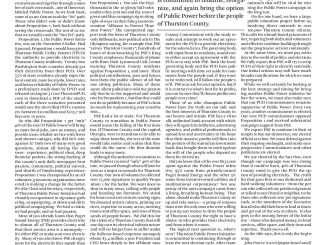
Public Power made him who he is! That’s why!
(Dennis Kucinich is coming 7PM February 4th at the Olympia Center.)
Dennis J. Kucinich is an independent, iconoclastic thinker who has charted a singular approach through the jungle of American politics, continually upending the status quo, not a path to sure success, but one which today identifies him as having been “ahead of his time” (Rolling Stone 1/9/2020) and “the future of politics” (Washington Post Magazine 4/9/18).
Elected to City Council at the age of 23, he challenged Cleveland’s powerful downtown business interests and demanded city neighborhoods be given priority in city planning and spending.
He led the way in exposing wasteful spending on white elephant projects in Cleveland such as a jetport in Lake Erie, a people mover in downtown Cleveland, floating hotels and a jai alai fronton.
He was best known as America’s youngest big-city Mayor, at age 31, Kucinich was elected on a promise to overturn the sale of the city’s municipal electric system. He canceled the sale when he took office. In 1978 Cleveland’s banking community attempted to force Kucinich to sell the utility, refusing to renew the city’s credit unless he approved the sale. The banks plunged the city into a fiscal default when Kucinich resisted.
It later was revealed that the lead bank was a business partner of the private utility which would have been handed a monopoly through the sale. Kucinich withstood tremendous pressure, assassination attempts, condemnation by corporate media and still refused to sell.
He lost the next election, sacrificing the mayor’s office because of the controversial default. He failed to regain major public office for 15 years, until he was elected to the Ohio State Senate in 1994. (His battle on behalf of “Muny Light” is the subject of an 800 page book due to be released next year.) Two years later Kucinich was elected to the US House of Representatives, representing the Cleveland area.
In 1998, the Cleveland City Council honored Kucinich for having “the courage and foresight” to refuse to sell the municipal electric system, a decision which has saved Clevelanders hundreds of millions of dollars in utility charges and taxes.
In Congress, Kucinich quickly earned a reputation defying his party’s leadership by organizing an effort to deny President Clinton authority to continue to bomb Serbia. In time Kucinich would emerge as the conscience of the Congress, relentlessly leading efforts against war, the threat of war, intervention or occupation in Serbia, Iraq, Iran Libya, Syria. His research in opposition to the Iraq War led him to submit Articles of Impeachment against President George W. Bush and Vice President Richard Cheney.
He is the author of legislation to create a cabinet-level US Department of Peace, to place peace-building as a central function of domestic and international policy. His efforts on behalf of peace, his seeking out and meeting world leaders in conflict areas, earned him numerous awards, including the Gandhi Peace Award.
A staunch civil rights advocate, Kucinich carried the legislative fight against the Patriot Act, “because I read it.”
In 2006, he and Congressman John Conyers, then-top Democrat on the House Judiciary Committee, introduced and organized for HR676, the Conyers-Kucinich National Health Insurance Act. This prompted a national debate which ensues to this day.
Kucinich, who represented a blue-collar, working class district in Cleveland understood the shortcomings of US trade policies and was a leader in attempts to place workers’ rights, human rights and environmental quality principles in all trade agreements. He attempted to defeat the China Trade deal, and tried to overturn NAFTA.
Kucinich’s leadership against war, for peace, for health care for all and for fair trade led him to seek the Democratic nomination for President in both 2004 and 2008.
He served 16 years in Congress, including a stint as chair of the Domestic Policy subcommittee of the House Committee on Government Oversight, where he investigated the subprime meltdown and the 2007-2008 financial collapse. He opposed the bailout of the banks and sought administrative policies which would help protect homeownership.
Kucinich is pursuing several writing projects, including the re-release of Courage to Survive, a childhood memoir of the life of a large family struggling to make it in Cleveland’s inner city; A Time for Peace, a recounting of his career-long exploration of the nature of war, the tragedy of American interventionism, paths toward conflict resolution, and the necessity of making peace-building a permanent function of government; The Cleveland Diet, Kucinich’s health struggles and his exploration of veganism, which began 25 years ago; and The Division of Light and Power, the epic, successful fight to save public power in Cleveland.
He and his wife, Professor Elizabeth Kucinich, a native of London England, travel between home in Cleveland and Washington, DC.
Mrs. Kucinich is an internationally known for her championing of regenerative agriculture, land restoration and protection of the environment. The couple were married in 2005. Kucinich has a daughter, Jacqueline, from a previous marriage.




Be the first to comment